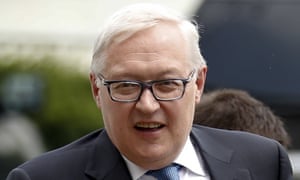
Russia has said new US sanctions against it approved by the House of Representatives on Tuesday will take relations between the two countries into “uncharted territory”, and said it is close to taking retaliatory measures.
The House of Representatives voted overwhelmingly in favour of imposing new sanctions on Moscow and requiring Donald Trump to obtain lawmakers’ permission before easing any sanctions.
The sanctions package, which also targets Iran and North Korea, “tightens the screws on our most dangerous adversaries in order to keep Americans safe,” the House Speaker, Paul Ryan, said after the bill passed by 419 votes to three.
It now heads to the Senate before Trump faces the choice of whether to veto the bill, which has been opposed by the White House.
Moscow had initially hoped Trump would work to repair a relationship that has slumped to a post-cold war low, but has watched with frustration as allegations that it interfered with last year’s US presidential election and concerns over Trump associates’ Russia ties have killed off hopes of detente. Russia denies the meddling accusations.
On Wednesday the Russian deputy foreign minister, Sergei Ryabkov, told the Interfax news agency that the latest US sanctions move left no room to improve relations in the near future.
“This is already having an extremely negative impact on the process of normalising our relations,” Ryabkov said. US-Russia relations were entering “uncharted territory in a political and diplomatic sense,” he added.
Russia has repeatedly warned the US it will retaliate against what it sees as hostile moves, and Ryabkov made clear Moscow was growing tired of showing restraint.
The Russian foreign ministry said this month that too many US spies operated in Russia under diplomatic cover and that it might expel some of them in retaliation for Washington’s expulsion of 35 Russian diplomats last year.
That warning reflected rising frustration in Moscow over the Trump administration’s refusal to hand back two Russian diplomatic compounds that were seized at the same time as the diplomats were sent home.
Many Russian politicians believe Trump’s political opponents and Congress have reduced the US president’s room for manoeuvre on Russia to almost nil. Ryabkov told Interfax the new sanctions bill was the “brainchild” of US Congressmen who hated Russia and wanted to box in Trump.
Konstantin Kosachyov, who heads the foreign relations committee in Russia’s upper house of parliament, called on Moscow to devise a “painful” response to the US move.
Despite initially opposing the bill, Trump appears to have few options in the face of near-total consensus in Congress. His spokeswoman Sarah Huckabee Sanders said the White House was still “reviewing the House legislation and awaits a final legislative package for the president’s desk”.
Trump has faced accusations that his administration sought to reassure Moscow that sanctions imposed by the Obama administration dating back to the Moscow’s 2014 annexation of Crimea from Ukraine could be lifted.
The bill also includes fresh sanctions against Iran and its Islamic Revolutionary Guard Corps, which stands accused of supporting terrorism, and North Korea, for its missile tests.
Iran’s president, Hassan Rouhani, said Tehran would respond in kind to any breach by the US of the 2015 nuclear deal. “If the enemy steps over part of the agreement, we will do the same, and if they step over the entire deal, we will do the same too,” Rouhani said at a televised meeting.
The Iranian parliament’s national security and foreign affairs committee said it would hold an extraordinary session on Saturday to discuss its response.
Comments
Post a Comment